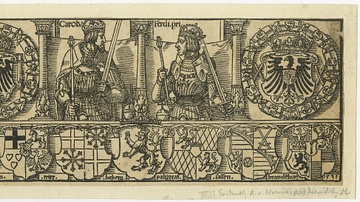Search
Search Results

Definition
Suleiman the Magnificent
Suleiman the Magnificent (aka Süleyman I or Suleiman I, r. 1520-1566) was the tenth and longest-reigning sultan of the Ottoman Empire. Hailed as a skilled military commander, a just ruler, and a divinely anointed monarch during his lifetime...

Definition
Einsiedeln Abbey
Einsiedeln Abbey and Monastery (German: Kloster Einsiedeln), located some 31 km (19 mi) southeast of Zürich at the foot of a hill in the town of Einsiedeln in Canton Schwyz, Switzerland, is the most important site of Roman Catholic pilgrimage...

Definition
Elizabeth I of England
Elizabeth I reigned as queen of England from 1558 to 1603. Her 44-year reign was so long and packed with momentous events that the second half of the 16th century is now known as the Elizabethan era and still regarded as a 'Golden Age' for...

Image
Holy Roman Emperors Charles V & Ferdinand I
Illustration of the Holy Roman Emperor Charles V (r. 1519-1556 CE) and Ferdinand I. The illustration depicts the Habsburg brothers Charles V (left) sitting by the imperial coat of arms, while Ferdinand (right) is flanked by the Habsburg coat...

Definition
George I of Great Britain
George I of Great Britain (r. 1714-1727) succeeded the last of the Stuart monarchs, Queen Anne of Great Britain (r. 1702-1714) because he was Anne's nearest Protestant relative. The House of Hanover secured its position as the new ruling...

Definition
Roman Republic
In the late 6th century BCE, the small city-state of Rome overthrew the shackles of monarchy and created a republican government that, in theory if not always in practice, represented the wishes of its citizens. From this basis the city would...

Definition
Women's March on Versailles
The Women's March on Versailles, also known as the October March or the October Days, was a defining moment in the early months of the French Revolution (1789-1799). On 5 October 1789, crowds of Parisian market women marched on Versailles...

Definition
Seleucid Empire
The Seleucid Empire (312-63 BCE) was the vast political entity established by Seleucus I Nicator ("Victor" or "Unconquered", l. c. 358-281 BCE, r. 305-281 BCE), one of the generals of Alexander the Great who claimed a part of his empire after...

Definition
Flight to Varennes
The Flight to Varennes was a pivotal moment of the French Revolution (1789-1799), in which King Louis XVI of France (r.1774-92), his wife Queen Marie Antoinette (1755-93), and their children attempted to escape from Paris on the night of...

Definition
Samuel
Samuel is a character in the Hebrew Bible and the Old Testament, uniquely depicted as having served several roles, as judge, military leader, seer, prophet, kingmaker, priestly official, and loyal servant of Yahweh. He is traditionally thought...